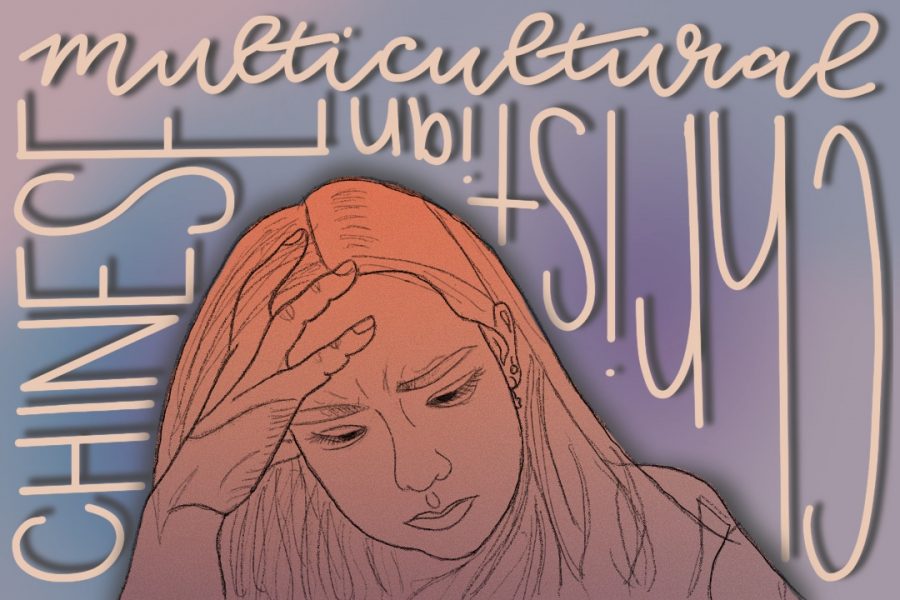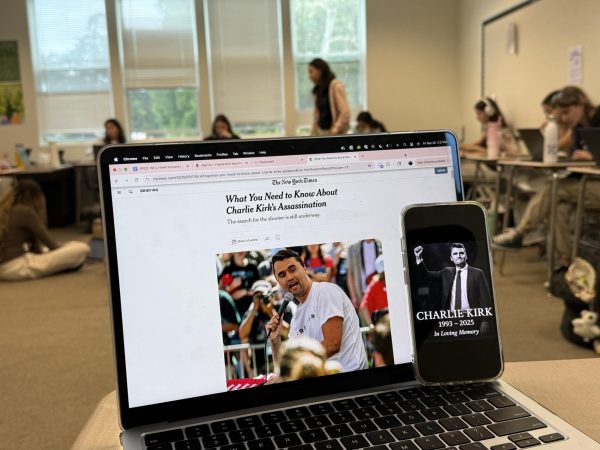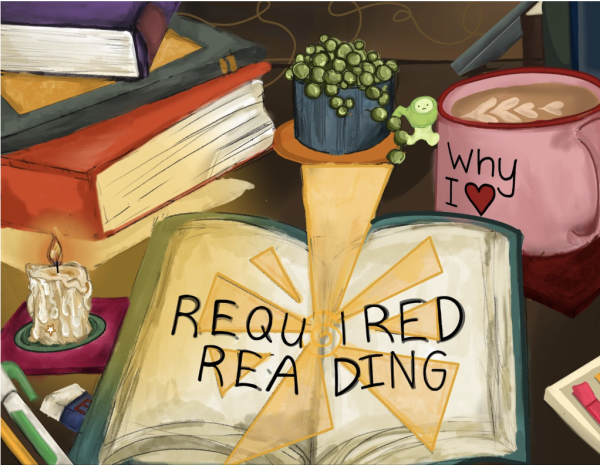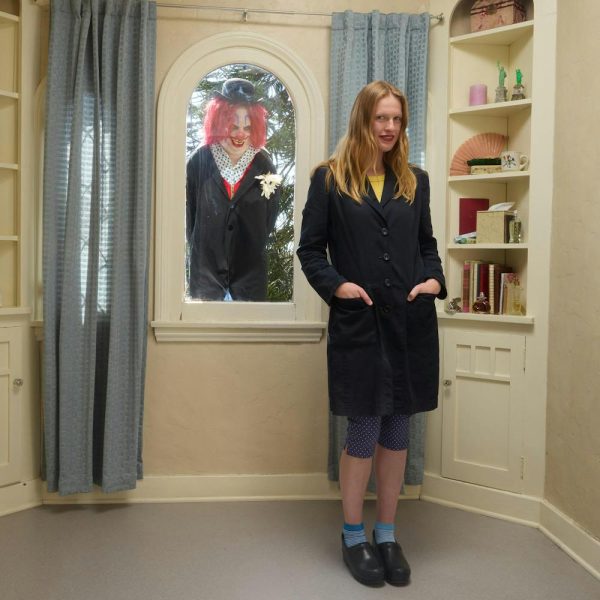Opinion: Joining An Affinity Group Was Easy, Deciding Which One Was Not
Growing up as a mixed Chinese-White American, I have always felt either not Chinese enough at home with my Chinese relatives or not White enough at school with my friends. Most of my close friends are White, and it is hard to join their conversations sometimes. While they are munching on leftover ice cubes from their water and bonding over vintage clothing they found in their grandma’s closet, I am drinking boiled water and admiring the jade bracelet, believed to bring good luck, that I found in my Chinese mom’s jewelry box.
So when a notification popped up on the top right of my computer screen labeled “2020-21 VIRTUAL AFFINITY FAIR IS HERE,” I initially thought about joining the Chinese affinity, but I wasn’t sure if I was Chinese enough. I feel completely Chinese when playing Chinese poker on Chinese New Year and eating dumplings and sticky rice cake with red bean paste, but I feel like an outsider in spaces where the people are entirely Asian.
I also considered the Christian affinity. Even though I attended a Catholic elementary school for three years, I am still not close with my religion. Missing church Sunday mornings became a recurring event when I was younger, and now, I am a Christmas-and-Easter Catholic, finalizing my decision not to join Christian affinity.
My last option was the multiracial affinity. However, I couldn’t bring myself to click the box to the left of “multiracial.” Weeks went by, and I was still questioning the affinity I should join—if one at all. I talked to one of my best friends and asked for her input. She suggested that I imagine being in each affinity and try to think which one I would be able to feel most comfortable in. It wasn’t too hard to imagine.
Not too long ago, my older sister posted a picture of my twin sister, Elizabeth, and me on her Instagram story. Later that night, while looking through some comments on the post, my sister told us that one of her friends thought that Elizabeth did not look mixed. Elizabeth clearly looked uncomfortable, but she just laughed it off. It is not a compliment to have a part of our identity ignored. Elizabeth and I receive these remarks very often, but I still do not know how to respond. Should I internally become annoyed and smile on the outside? Or should I finally explain that it is not their job to tell me what my race is?
When I asked Elizabeth what affinity she wanted to join, she responded that at first, she decided on the Chinese affinity, but then she said, “I feel like if we join the Chinese affinity, people might judge us.”
In other words, I would judge myself for joining the Chinese affinity. Am I allowed to join if I am only half Chinese? Can I even label myself as Chinese without including that I’m White? Even though I am mixed, my Chinese culture and heritage are more prominent than my American culture, and I feel more Chinese. Shoes cannot be worn in the house, I’ve been playing piano for ten years, and a B+ or A- angers my Tiger mom. At school, my non-Asian friends ask about Chinese holidays, or they ask me to quiz them on Chinese numbers. I snack on red bean candy instead of carrots, and I eat bok choy instead of kale or celery. I rarely have pancakes and bacon, and instead, I have congee or a steamed pork bun.
Although I identify more Chinese, at home, I am laughed at for being inauthentic identifying as Chinese. Most of my aunts and uncles in China think that I cannot speak or understand their language. When I visit them in Shenyang, my mom’s hometown, they start by greeting me in English, but it sounds like staccato notes on an out-of-tune piano. When I remind them that I can speak and understand Chinese, they don’t believe me, and my mom is the only person who can convince them. Although most of my conversations with my mom are in “Chinglish,” she sometimes explains Chinese words I already know, thinking that I still cannot get the basics down. When my mom watches celebrations for Chinese holidays and traditions, sometimes she will say to me, “为什么你在看? [Why are you watching] You 不是 [are not] Chinese.”
Whenever I talk about my mom’s traditions or my dad’s traditions, it feels like cultural appropriation of my own cultures. I know I’m not alone. Many of my peers are also mixed in some way, but we don’t always talk about it. Maybe we should, so I decided to join the Multiracial affinity.
On the day of the first Multiracial affinity meeting, I sat in front of my computer and waited for students to pop into the Teams meeting. Once all of the “dings” died down from people joining the meeting, we popcorned around the screen, waiting to see whose name would be called next to share their race. After a distorted “Julia” sounded from my mouth and I shared my pronouns and race, I sat up taller and clicked the mute button.
The affinity was more diverse than I expected. Every mixed person was unique, and everybody experienced some of the tension I had felt, but it was refreshing to be in a space where the question “What are you?” didn’t feel like an accusation. As the meeting progressed, comfort shattered the ice, and the rampant poking of butterflies in my stomach settled. We did a couple of get-to-know-you activities, including making a friendship bracelet. I smiled as the affinity heads suggested we rip documents that ask us to select a race but do not include a multiracial option.
After the meeting ended, I opened my door to the loud yawn and stretch Elizabeth does after her classes. Meeting at the bottom of the stairs, we rushed to help bring the dumplings to the dining table. From the orange color that peeked through the dumpling skins, I could tell that the filling consisted of carrots and chicken, one of my favorites. Across the table, my mom was squinting her eyes to read a new message on WeChat. To my right, my dad was deciding whether or not he liked this dumpling filling. To my left, Elizabeth brought up a story about her Asian friend who experienced more racism after COVID-19 started, and my mom, without looking up, replied, “Remember, you are White.” Elizabeth and I exchanged a quick side glancing, smiling with mouths full of warm dumplings. Yes, we know we are White, but we also know we are Chinese.
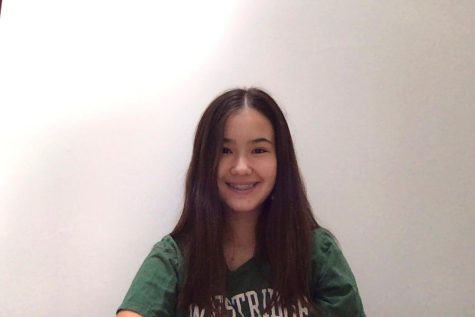
Julia is a freshman staff writer, and she joined Spyglass to strengthen her writing and conversational skills. In her free time, Julia likes to read and...

Julia is a freshman staff writer, and she joined Spyglass to strengthen her writing and conversational skills. In her free time, Julia likes to read and...




























![Dr. Zanita Kelly, Director of Lower and Middle School, pictured above, and the rest of Westridge Administration were instrumental to providing Westridge faculty and staff the support they needed after the Eaton fire. "[Teachers] are part of the community," said Dr. Kelly. "Just like our families and students."](https://westridgespyglass.org/wp-content/uploads/2025/03/dr.-kellyyy-1-e1748143600809.png)






















